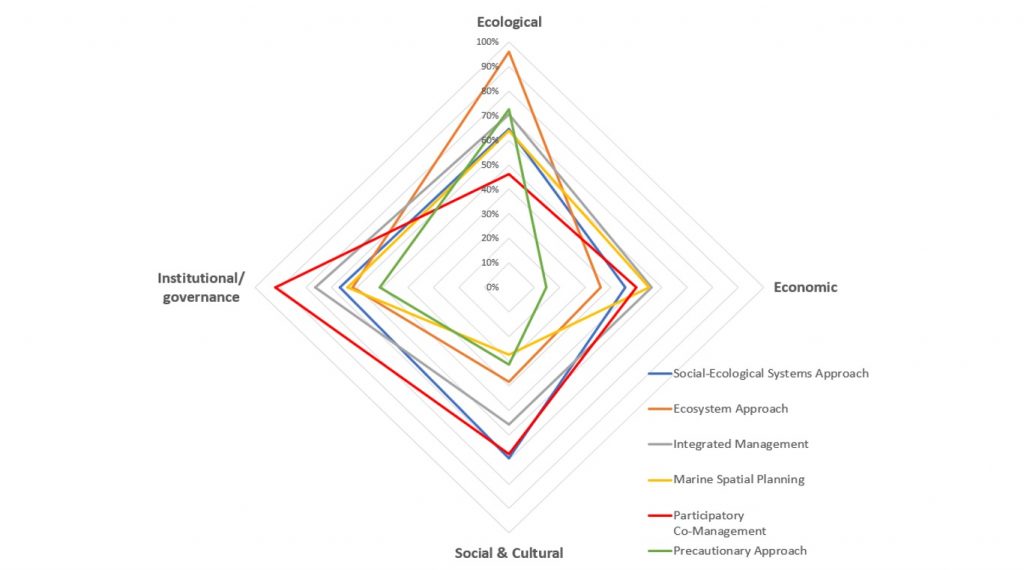Stephenson RL, Hobday AJ, Allison EH, Armitage D, Brooks K, Bundy A, Cvitanovic C, Dickey-Collas M, Grilli NM, Gomez C, Jarre A, Kaikkonen L, Kelly R, López R, Muhl E-K, Pennino MG, Tam JC and van Putten I (2021) The Quilt of Sustainable Ocean Governance: Patterns for Practitioners. Front. Mar. Sci. 8:630547. doi: 10.3389/fmars.2021.630547
Key points:
- Full-Spectrum Sustainability remains a critical governance challenge.
- Sustainability is an interdisciplinary problem and requires attention to ecological, social/cultural, economic and institutional objectives.
- Six key sustainability related concepts, compared in this paper, share similar broad aims.
- Sustainability concepts are evolving to be more comprehensive and interdisciplinary.
- Concepts are especially strong for ecological and institutional or governance aspects, moderately strong for economic aspects, and weakest for the social-cultural pillar of full-spectrum sustainability.
- There is no panacea, and no emergent hierarchy among concepts.
- We propose there is need for a quilt of concepts and objectives to achieve full-spectrum. sustainability. (No matter how influential or dominant a single concept might be, different concepts will be used in different areas, and there may always be the need for a combination of concepts and objectives woven together to achieve a cohesive quilt of sustainability).
- The selection of the core concepts for a situation will depend largely on which concepts are specified in the legal and policy context.
- Desirable features from these frameworks could be woven together to form the basis of more effective and equitable ocean governance arrangements.
In recent decades, scientists and practitioners have increasingly focused on identifying and codifying the best ways to manage activities in marine systems, leading to the development and implementation of concepts such as the social-ecological systems approach, ecosystem-based management, integrated management, marine spatial planning, participatory co-management, and the precautionary approach. To date, these concepts appear as separate entities: they have parallel literature streams; have been applied most often individually in attempts to improve governance and management; and in many ways, seem to be competing for attention. This patchwork of approaches may be hindering effective ocean governance. We propose that desirable features from these frameworks could be woven together to form the basis of more effective and equitable ocean governance arrangements across contexts, sectors and scales. This paper, which originated from a workshop/session at the IMBeR (Integrated Marine Biosphere Research Project) 2019 Future Oceans2 Open Science Conference) concludes:
Full-spectrum sustainability remains a critical governance challenge – There is increasing international interest in and attention to sustainability. Sustainability requires consideration of ecological, economic, social (including cultural) and institutional objectives. We identified 13 objectives from literature, SDGs and international agreements, and evaluated how these diverse considerations are included in six sustainability-related concepts (social-ecological systems approach, ecosystem-based management, integrated management, marine spatial planning, participatory co-management and precautionary approach). Achieving greater cross-sectoral integration, or a more holistic perspective on management for sustainability is at the core of each concept. All deal with aspects of governance, and most with improved participation in governance. Sustainability is a transdisciplinary problem that requires additional disciplinary capacities and methods in coastal and ocean management agencies.
No single concept is a panacea for sustainability – The co-authors of this paper found it difficult to have consensus on whether some sustainability objectives were explicit or implicit in concepts, because the six concepts differ in their origins, use and scope (or emphasis) on the diverse objectives of sustainability. Overall, the concepts are especially strong for two pillars (ecology and institutional/governance), weaker for economic aspects, and weakest for the social-cultural pillar of full spectrum sustainability. Practitioners should be aware of the relative strengths and foci of the different sustainability concepts. Sustainability concepts are evolving, and further progress will undoubtedly be iterative. Our results revealed no ‘continuum’ or ‘hierarchy’ with respect to the concepts considered in the paper. Pragmatically, different concepts will be used in different areas depending upon the particular needs and focus sought.
Sustainability requires a quilt of concepts and objectives – We identify that, ideally, there may always be the need for a combination (i.e., a quilt) of concepts and objectives used together to achieve and improve sustainability outcomes. While some concepts are more prominent in legislation, and the selection of the core concepts for a situation will undoubtedly depend in large part on which concepts are specified in the legal and policy context of the situation (area) of interest. We suggest that there is scope in the implementation of any of these concepts, for practitioners to supplement the concept, in efforts to achieve full spectrum sustainability. We propose that the quilt is a strong analogy – and that practitioners with knowledge of the relative strengths and weaknesses of concepts can arrange patches as required, to collaboratively form a complete and effective management system. We recommend that it is useful to think of the quilt, comprised of the objectives and elements considered in this paper, as compiling ‘best practice’, and as the basis for a coherent approach to sustainability in the face of global change.
